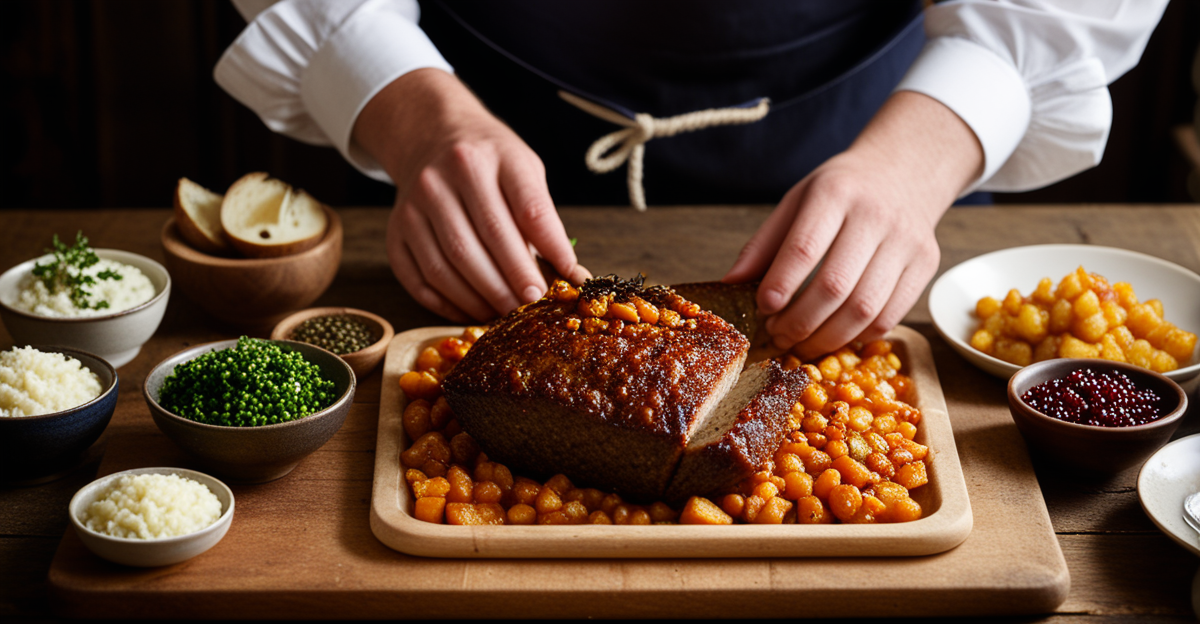Elevating Classic British Flavours with Innovative Ingredients
Bringing unique ingredients for British recipes into the kitchen transforms traditional dishes into exciting culinary experiences. In the world of British cuisine innovation, introducing global spices, unusual produce, and modern twists enriches both taste and visual appeal. Imagine adding sumac or smoked paprika to a classic shepherd’s pie. These unique ingredients for British recipes deepen the flavour profile without losing the dish’s comforting essence.
Using novel vegetables such as purple carrots or kohlrabi redefines texture and colour in familiar plates, aligning perfectly with the push for British cuisine innovation. These ingredients bring not only a fresh aesthetic but also nutritional benefits, turning a traditional roast or vegetable mash into something vibrant and healthful.
In the same genre : How Can Traditional UK Cookery Influence Modern Culinary Trends?
Swapping out standard ingredients for less common ones sparks creativity. For example, replacing typical potatoes with salsify in a pie introduces Earthy nuances, offering a tasteful update to a humble dish. Such thoughtful ingredient choices showcase how employing unique ingredients for British recipes can modernise classics while honoring their original roots. Exploring these pairing possibilities encourages cooks to elevate and personalise British classics effortlessly.
Elevating Classic British Flavours with Innovative Ingredients
Bringing unique ingredients for British recipes into the kitchen breathes fresh life into beloved classics. Rather than changing the essence of traditional British dishes, carefully chosen global spices, unusual produce, and innovative twists can enhance both taste and presentation. For example, swapping out regular potatoes for purple carrots in mash introduces vibrant colour alongside additional nutrients, without overshadowing the familiar comfort of the dish.
Also read : How can you pair beverages with traditional UK meals?
Incorporating novel spices like sumac or smoked paprika adds aromatic complexity that amplifies traditional stews and roasts. These British cuisine innovations transform simple meals into multi-dimensional experiences. The subtle zing from such exotic seasonings complements meat-rich dishes perfectly, opening avenues for flavour exploration without sacrificing authenticity.
Innovative ingredient pairings extend beyond spices into creative produce combinations—mixing kohlrabi with classic root vegetables refreshes textures and elevates plate appeal. Such experimentation appeals to home cooks seeking to honour heritage recipes while indulging curiosity. By weaving these unique ingredients for British recipes into familiar staples, the evolution of British cuisine becomes a celebration of innovation balanced with respect for tradition.
International Spices Breathing New Life into Traditional Fare
Introducing international spices for British food offers a vibrant way to enhance classic British dishes. Spices like sumac, za’atar, and smoked paprika inject warmth, acidity, and complexity into recipes that might otherwise feel predictable. By adding these globally sourced seasonings, cooks bring refreshing flavour enhancements that uplift traditional roasts, stews, and shepherd’s pie without overshadowing their heritage.
How do these spices transform classic plates? Sumac adds a bright, lemony tang ideal for balancing rich meat dishes, while smoked paprika contributes subtle earthiness and smoky depth. Za’atar’s herbal, nutty notes complement roasted vegetables or grilled meats, introducing aromatic layers that excite the palate.
In modern British cooking, such seasonings encourage creativity and inclusivity, merging global influences with homegrown traditions. For example, sprinkling smoked paprika over mashed potatoes in a shepherd’s pie introduces a mild smoky accent, enriching the dish’s familiar comfort. Similarly, za’atar on Sunday roast vegetables elevates their flavour profile, making a well-loved classic unexpectedly fresh.
These spices are easy to incorporate and versatile, inviting cooks to experiment and steadily refine their British cuisine innovation with exciting, accessible additions.
Elevating Classic British Flavours with Innovative Ingredients
Introducing unique ingredients for British recipes invigorates classic British dishes by complementing their familiar essence with fresh, inventive touches. Careful selection of British cuisine innovation allows for flavour and presentation upgrades without overwhelming traditional profiles.
Global spices such as sumac, za’atar, and smoked paprika add aromatic layers that deepen taste dimensions in stews, roasts, and shepherd’s pie. This intentional blending preserves the comfort of heritage recipes while opening palates to diverse flavour experiences.
In parallel, incorporating unusual vegetables like kohlrabi, salsify, or purple carrots revitalises dishes visually and texturally. These vegetables not only enrich colour but also introduce nutritional benefits, transforming ordinary mash or pies into nutrient-packed, vibrant plates. When paired thoughtfully, these novel ingredients respect the roots of classic meals and encourage creative exploration in home cooking.
Ultimately, pairing unique ingredients for British recipes with traditional staples balances authenticity and modernity. This approach revitalises beloved dishes, inspiring cooks to experiment confidently within the framework of British cuisine innovation. Whether adjusting spice blends or adding unexpected vegetables, these transformative methods amplify the appeal of time-honoured British fare.
Incorporating Unusual Vegetables for a Modern Twist
Adding unusual vegetables in British cuisine revitalises traditional recipes with a twist by introducing new textures, colours, and nutritional benefits. Root vegetables like salsify bring an earthy sweetness to pies, while kohlrabi’s crispness complements mashed potatoes or roasted medleys. Purple carrots, apart from their striking hue, enrich dishes with antioxidants, making familiar plates more healthful and visually appealing.
How can these vegetables fit into vegetable-centric British dishes? Kohlrabi, sliced thin and roasted, offers a pleasant crunch alongside a Sunday roast. Salsify mashed with a knob of butter preserves its delicate flavour while adding rustic character to classic shepherd’s pie. Purple carrots can be used raw in salads or roasted to sweeten a vegetable side, updating the plate without overwhelming traditional tastes.
Incorporating these vegetables into traditional recipes with a twist requires minimal effort but yields impressive impact. Simply swapping standard potatoes for salsify in a pie or adding kohlrabi to a root vegetable mix celebrates British cuisine innovation elegantly. These subtle yet distinctive ingredient choices invite cooks to refresh time-honoured dishes, aligning heritage with a modern culinary mindset.
Elevating Classic British Flavours with Innovative Ingredients
Incorporating unique ingredients for British recipes invigorates classic British dishes by introducing global spices, unusual produce, and inventive twists. These additions don’t overshadow tradition but rather enhance familiar flavours and textures. For instance, blending exotic spices such as sumac or smoked paprika with traditional seasonings enriches the palate, offering subtle but exciting depth.
Unusual vegetables like kohlrabi or salsify bring unexpected crunch and colour, updating the visual appeal and nutrition of staple meals like pies or roasts. Their incorporation exemplifies British cuisine innovation, harmonising modern health trends with heritage cooking.
Pairing these fresh ingredients thoughtfully with British staples allows cooks to embrace creativity confidently. Swapping standard potatoes for purple carrots in mash brightens the plate while maintaining comfort. This balance ensures that classic British dishes remain approachable yet intriguingly different.
Ultimately, these ingredient choices showcase how innovation in British cooking refreshes recipes without losing their core identity. They invite food lovers to rediscover traditions with a modern twist, making everyday meals both nostalgic and novel.
Elevating Classic British Flavours with Innovative Ingredients
Introducing unique ingredients for British recipes can effectively transform classic British dishes by enriching their flavour and appearance. Global spices, unusual produce, and thoughtful ingredient swaps serve as potent tools in British cuisine innovation, allowing traditional meals to evolve while preserving their character.
For instance, incorporating spices like sumac adds a bright tang that complements the richness of meat stews. Novel vegetables such as purple carrots or salsify not only brighten visual appeal but also boost nutrition, making trusted favourites more exciting. Such ingredients integrate seamlessly with staples like mashed potatoes or roast vegetables, fostering subtle yet impactful changes.
How do these swaps inspire cooks? By balancing familiarity with novelty, they encourage experimentation without overwhelming the palate. When you replace or enhance with care—perhaps swapping regular potatoes for kohlrabi in mash or adding smoked paprika to gravy—the classic remains recognisable, yet revitalised.
This approach unlocks new sensory dimensions and keeps British culinary heritage dynamic. Through these unique ingredients for British recipes, British cuisine innovation becomes accessible, inviting home cooks to refresh the essence of traditional fare with vibrant, modern touches.
Elevating Classic British Flavours with Innovative Ingredients
Adding unique ingredients for British recipes redefines the appeal of classic British dishes by blending tradition with innovation. Introducing global spices, such as sumac or smoked paprika, enhances the depth of familiar flavours without overpowering them. These aromatic additions add brightness or smokiness, subtly transforming roasts, stews, and pies.
Unusual produce further elevates these dishes. Vegetables like kohlrabi, salsify, or purple carrots change the texture and visual appeal, providing fresh nutritional benefits. For instance, substituting standard potatoes with purple carrots brightens mash recipes while preserving comfort. These swaps exemplify British cuisine innovation, marrying modern health trends and culinary curiosity with heritage.
Pairing these novel ingredients thoughtfully alongside traditional staples inspires cooks to experiment confidently. For example, smoked paprika in gravy or za’atar on roasted vegetables creates exciting yet approachable flavour contrasts. This balance allows home cooks to reimagine favourites while maintaining their essence.
By embracing global spices and unusual produce, chefs and enthusiasts alike contribute to the ongoing evolution of British cuisine. Using unique ingredients for British recipes turns classic dishes into vibrant, modern meals that celebrate flavour diversity while respecting time-honoured roots.








